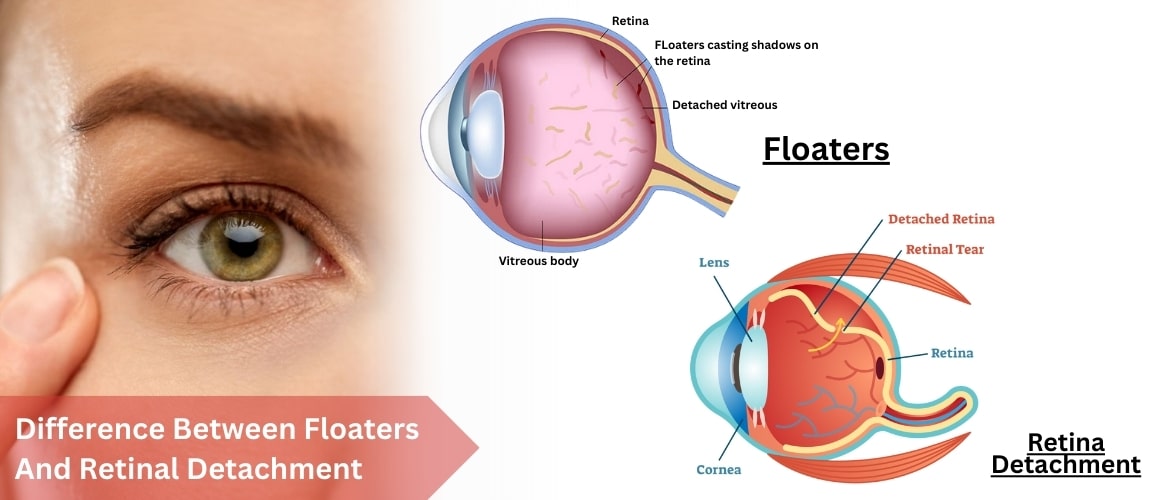Eye floaters or spots are some specks, dots or lines in the field of your vision. Though harmless, they can be the initial symptom of retinal detachment. Booking an appointment with an eye specialist before the time flies is recommended.
We have thoroughly explained the difference between floaters and retinal detachment here so you can better understand your eye health.
What Are Floaters?
Eye floaters are simply spots/ black dots/ zigzag lines in your vision. They look like strings, cobwebs or specks that move your eye movement. These spots generally develop due to age. They develop when the liquid substance in our eyes called vitreous liquifies and contracts. Then these vitreous opacities cast a shadow on the retina leading to the development of floaters.
Early appearances of Floaters
The initial appearances of floaters are:
Small shapes in your eyesight that seem like black flecks or knobby, transparent strings of floating material.
Spots that move when you move your eyes, so when you try to look at them, they swiftly move out of your field of vision.
Spots that are most obvious when viewed against a plain bright background, such as a blue sky or a white wall.
Small forms or strings that gradually settle down and float out of the field of view.
Causes of Floaters or Eye Spots
In most cases, floaters are caused by posterior vitreous detachment, which occurs when the vitreous separates from the back of the eye. It results in the bubbling of vitreous liquid and flashes. In some cases, the floaters are formed when the head is banged against some hard object and you start seeing ‘twinkling stars’
Apart from the causes mentioned above, floaters may also result from Migraine which causes spasms of blood vessels in the brain resulting in blurry vision. Some other conditions in which harmless floaters can be observed commonly are:
Nearsightedness
Cataract surgery
Diabetes
Laser Eye Surgery
Eye Infection/ Inflammation
Treatment of Floaters or Eye Spots
In most cases, eye floaters fade away with time, but if you notice one for the first time, it’s advisable to seek medical help, as it can be an initial sign of retinal detachment.
What is Retinal Detachment?
The retina is an important structure at the back of the eye. When light falls into our eye, the retina acts as a light sensor, and it forms a bridge between the lens and brain, helping us see objects. When the retina separates from the back of the eye, it’s commonly called retinal detachment. The condition is serious, as it can be a major cause of vision loss.
Early Symptoms of Retinal Detachment
The initial symptoms of retinal detachment are:
Blurry vision
Vision loss is like a curtain falling in front of the eye
Partial visual field
Shadow formation
Flashes or spots while focusing
Causes of Retinal Detachment
The main cause of retinal detachment is aging. As we grow, the vitreous attached to the retina changes shape, shrinks, and separates from it. In most people, this happens smoothly without any problems. In some people, it leads to the formation of holes in the retina, leading to detachment.
Some other conditions associated with this are:
Eye Injury
Family history of retinal detachment
Diabetes
High myopia
Treatment of Retinal Detachment
Treatment is possible if the problem is diagnosed in the early phase. Surgery can prevent vision loss. MMJ Eye Institute Hubli has a team of specialized doctors who are experts in early diagnosis and effective treatment to restore vision.
Conclusion:
Eyes are sensitive, and taking care of them is significant. If you face any kind of vision problem, such as flashes, spots, or blurry vision, you should consult an eye specialist as soon as possible. Continuous blurry vision can be the initial phase of retinal detachment. Timely intervention and treatment can prevent the loss of vision and help you lead a healthy life.
FAQs
Floaters do not mean retinal detachment until the problem persists for a longer duration. A retinal detachment is due to the separation of the retina from the back of the eye. It is a serious problem and requires immediate medical intervention.
The early signs of retinal detachment are blurry vision, recurring spots or flashes, and shadow formation while you look at the object.
Eye floaters usually fade away with time. But when the problem recurs and becomes more frequent you should consult an eye specialist.
Yes, commonly floaters are just due to the ageing process. Floaters are also one of the early symptoms of retinal detachment. They may fade away with time. But if the situation persists it is a sign of serious illness. You should seek immediate medical attention before the condition worsens.
Some of the best practices to strengthen the weak retina are eating healthy food, regular exercise, regular eye check-ups, and protecting the eyes from harmful sun rays, pollution etc.
No, a damaged retina cannot repair itself. An eye surgeon can help you by following the surgical procedures.


No comments yet.